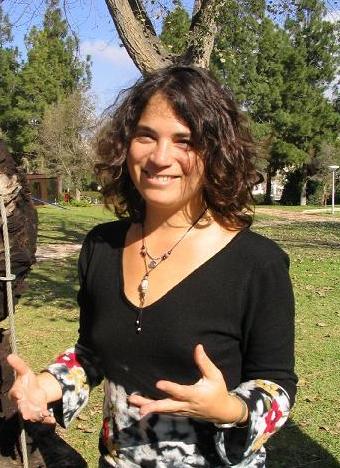Dr. Dorit Ahronov from the Hebrew University was chosen by the prestigious journal Nature as one of 4 young scientists from around the world for a portrait article to mark the 100th anniversary of Einstein's "wonderful year"
In the photo: Dr. Dorit Aharonov at the Edmond Y. Safra campus in Givat Ram. Photo: Ahuva Moalem.
Dr. Dorit Ahronov from the Benin School of Engineering and Computer Science at the Hebrew University was selected by the prestigious scientific journal Nature as one of four young scientists for a portrait article in the January 2005 issue, on the 100th anniversary of Albert Einstein's "wonderful year" in which they were published His four groundbreaking studies at the age of 26.
In the last decade, a new computational model based on the laws of quantum physics revolutionized the theory of computer science. This revolution may have far-reaching technological and theoretical implications. Quantum computers, if they were built, could solve certain calculation problems at a speed that is incomparable to the calculation capacity of any existing computer. The acceleration in the calculation comes from the fact that a physical-quantum system is able to exist simultaneously in all possible calculations. Dr. Dorit Aharonov investigates the most important challenges in this promising direction.
"I was very happy about the choice of Nature. This indicates the importance that scientists around the world attach to the field of quantum computing," says Dr. Dorit Aharonov. "This field combines tools from physics and mathematics to study questions that are philosophical in nature, such as: What is the computational power of nature? How does the transition between quantum and classical physics occur? and so on".
Aharonov's research focuses on a central problem in the understanding of quantum computers. Large-scale quantum systems are extremely sensitive to noise. The effect of noise can destroy the entire calculation. In her doctoral thesis, Aharonov and her supervisor Prof. Michael Ben-Or found a theoretical method on how to protect quantum computers from noise. This result proved that in principle noise is not an obstacle on the way to building quantum computers on a large scale. Many laboratories around the world are currently trying to build quantum computers. The current world record is a 7-bit quantum computer.
Dr. Aharonov's research after her doctoral thesis revealed several connections between the resistance to errors of quantum calculation and a question that remains open in physics: why are most of the phenomena we see around us classical, while the physical laws that describe them are quantum? In addition to this, Dr. Aharonov's research deals with the development of new techniques for solving difficult calculation problems using the laws of quantum physics.
The other three young researchers selected for a portrait in the journal Nature are: Nima Arkani-Hamed from Harvard University in the USA; Senthil Toddri from MIT in the USA; Martin Bujwald from the Max Planck Institute in Germany.


2 תגובות
Very impressive and brings a lot of respect.
Ascension atonement